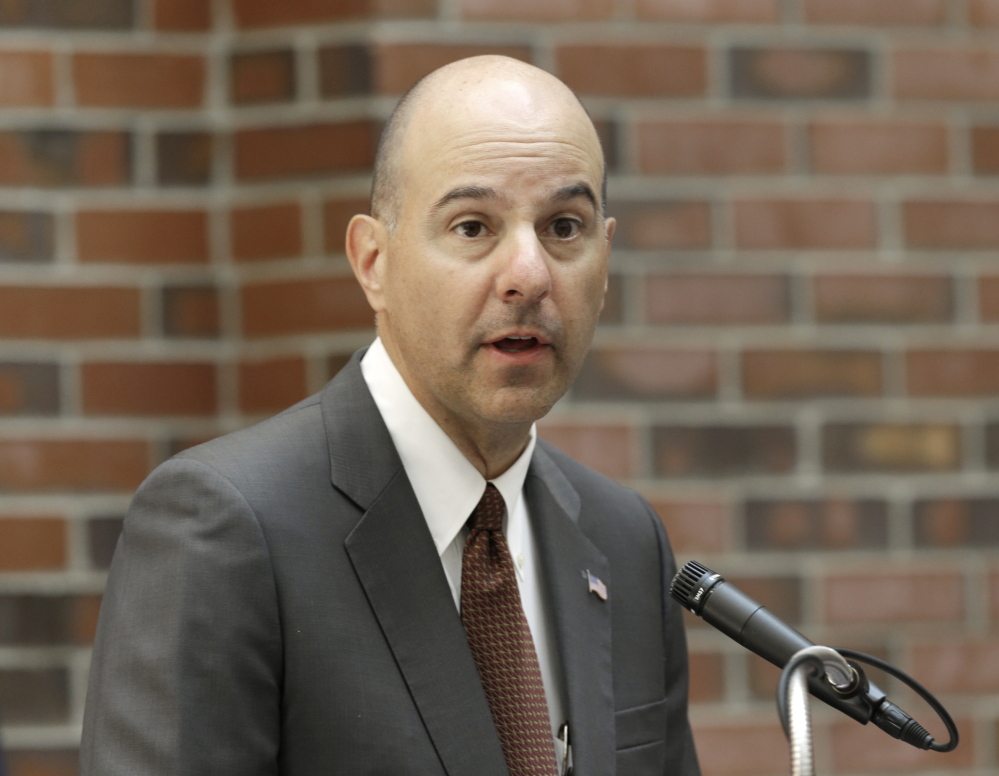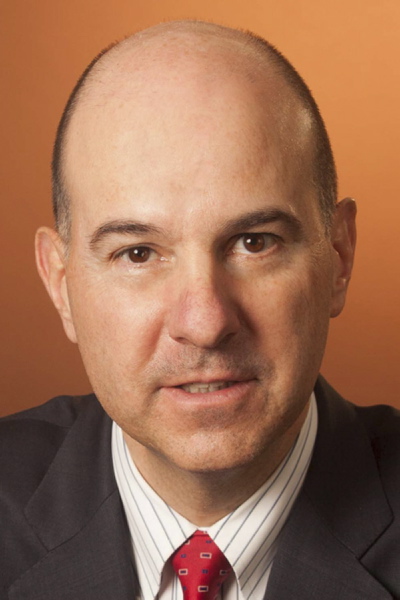Maine is strategically positioned to lead the next wave of American innovation, argues David Kappos, a New York-based intellectual property attorney who will be speaking in Portland on Monday. It’s a bold statement, but one Kappos is uniquely qualified to make.
Over the course of his career as IBM’s chief intellectual property attorney and then as director of the U.S. Patent and Trademark Office, a position he held from August 2009 to January 2013, Kappos has been all over the world and observed the qualities of place that foster innovation. He is also a part-time Mainer who has owned a second home near Thomaston for more than a decade.
“So I’ve certainly been around the innovation world for a lot of years,” he said. “After a while you get used to identifying innovation and sources of it when you see it.”
Kappos, who is now a partner at Cravath, Swaine & Moore LLP in New York City, has written an article in the upcoming issue of Maine Policy Review about Maine’s specific cultural traits that lend themselves to innovation and why those advantages position the state to succeed in the new economy. Maine has a long history of innovation, Kappos said, from Chester Greenwood’s earmuffs to John Ruggles, the U.S. senator from Maine who is the “father of the modern patent system” and was also an inventor and recipient of U.S. Patent 1, issued in 1836.
“Maine punches far above its weight class – in many respects,” Kappos writes in his article, which is expected to be published soon.
Kappos will be at the University of Southern Maine on Monday to give a talk on his article and Maine’s innovation future. The event, part of the L.L. Bean/Lee Surace Colloquium Series, will be held at USM’s Glickman Library from 4:45 to 5:50 p.m. Monday.
Kappos spoke with the Portland Press Herald about his article and upcoming talk. What follows is a transcript edited for length and clarity.
Portland Press Herald: You’ve written an article for the upcoming issue of Maine Policy Review in which you argue that Maine can play a significant role in the 21st century and American innovation. Tell me about your argument.
Kappos: I’ve always been impressed with Maine. I had not analyzed it carefully, but even before I was at the patent and trademark office, and certainly while I was there, I was traveling all over the world and talking about innovation and meeting innovators and long observed that Maine had a special culture of innovation, people coming up with creative ways to solve problems.
You had this rural state, people would say an unpopulated region, for a long time it was just like a county in Massachusetts, but creating these enormously important inventions. But what about now? What does Maine do going forward? It’s a very independent state. In fact, my observation is that it is the most individual and unique of any of the 50 states. It’s got its own way of doing things. It’s got its own culture. And so how does Maine exploit its natural tendency toward innovation going into the future? It’s got to do it Maine’s way and not some other way. I applaud Maine policymakers who are leveraging great work done in other states, but it’s got to then turn those practices into approaches that work for Maine, that suit Maine’s natural advantages.
PPH: So what, besides a culture of independence, are Maine’s natural advantages for innovation?
An example that is developing, but I would assert can be huge, is based on the gigabit Ethernet, the Three-Ring Binder (high-speed broadband service). People think of the gigabit Ethernet as something you go to Korea for. Everybody knows Seoul and Singapore are the two places you can get gigabit Ethernet. Not too many people know there’s a third place: Maine. That was a really forward-thinking initiative. That kind of technology opens the doors for many new business ideas and models that people can’t even imagine. But folks will go and invent all this stuff that will ride on top of the great infrastructure once the great infrastructure exists. What do policymakers do? Obviously provide support, seed funding, the incubation, (as) Maine is already doing. You double down on that stuff. You have the infrastructure. The hard part is done. It’s time to now move to the phase of supporting the business activity that history shows will come to great infrastructure.
Probably the most important thing I learned is that the hardest part of innovation is neither having a good idea, nor access to capital. Neither is it access to natural resources nor manufacturing skills. It turns out the biggest impediment to taking a good idea and making it into a marketplace outcome – the biggest, rare, scarce resource – is mentorship. People who’ve made all the mistakes, hopefully have some successes, been there done that, got the gray hair. I’ve traveled from Africa to Asia to Europe, all over the United States, South America, and the biggest issue is always mentors. Maine, however, is the one place that has a surplus of mentors. Why? Because it’s such a mecca for successful people who have the skills. Some are native Mainers who moved to other places, became successful, and come back because Maine is so beautiful. And then there are the people like myself and my wife who weren’t born in the state, but were attracted by its natural beauty and it not being so crowded, and the culture of the state. You put all those people together and Maine actually has this surplus of mentorship skills that almost no other place in the world has. You exploit it and you have the opportunity for Maine to be extremely successful in the innovation ecosystem.
PPH: The number of patents per capita is often a metric used to measure a state’s level of innovation, but Maine historically does not rank very high using this metric among other states.
Well, patents are one measure, but they’re by no means the only measure. I don’t worry about that metric for Maine. It’s a metric that works better for the states that have a lot of very large businesses. And Maine just isn’t that kind of state. In the case of Maine, the numbers are far less important than quality and impact. You don’t need to have 100,000 patents coming from your state. You need to have 100 that produce businesses.
I was out in (Silicon) Valley in California earlier this week, and the Valley of course is the most famous place in the world for turning ideas into marketplace outcomes. People there don’t talk much about quantities of patents. In fact, I didn’t have that discussion once when I was there. It’s all about finding the next great idea and moving it quickly and successfully into the marketplace. I think that’s the focus that is the right one for Maine.
PPH: What are the challenges Maine faces in leveraging those advantages for success?
The low population density creates challenges because of the need to move around to be near people you need to work with. There’s a demonstrated correlation between proximity and innovation success. And Maine will always have some challenges to overcome in that regard because it is a very spread-out state with low population density. Policymakers, as well as the innovation community, the private and public sector, need to work together to overcome that hurdle, because it isn’t going away. And you don’t want it go away. You don’t want 40 million people in Maine.
PPH: Can you expand upon the idea of mentors? How do you take these retirees, second-home owners and other potential mentors and get them involved in the entrepreneurship community?
It’s actually not a heavy lift to get people to be mentors because mentorship doesn’t take much time. What the mentee is trying to get is the off-the-cuff reaction and the immediate advice. You’re not asking the mentor to go write a book for you. The first mechanism is establishing networks for the mentors to find their way into (the entrepreneurship community). Make those connections so a mentor’s availability, skills and expertise can be available to people looking for mentorships.
PPH: What are the proper roles of the private and public sectors in supporting innovation and the entrepreneurship community?
That’s a great question. I can say this with some credibility: Anything that can be done by the private sector, should be done by the private sector, and will likely be much more effective if done by the private sector. There are some obvious exceptions to that, things like fire, police and public safety. But for what we’re talking about, I think the private sector role should be maximized.
Whit Richardsoncan be contacted at 791-6463 or at:
wrichardson@pressherald.com
Send questions/comments to the editors.




Success. Please wait for the page to reload. If the page does not reload within 5 seconds, please refresh the page.
Enter your email and password to access comments.
Hi, to comment on stories you must . This profile is in addition to your subscription and website login.
Already have a commenting profile? .
Invalid username/password.
Please check your email to confirm and complete your registration.
Only subscribers are eligible to post comments. Please subscribe or login first for digital access. Here’s why.
Use the form below to reset your password. When you've submitted your account email, we will send an email with a reset code.